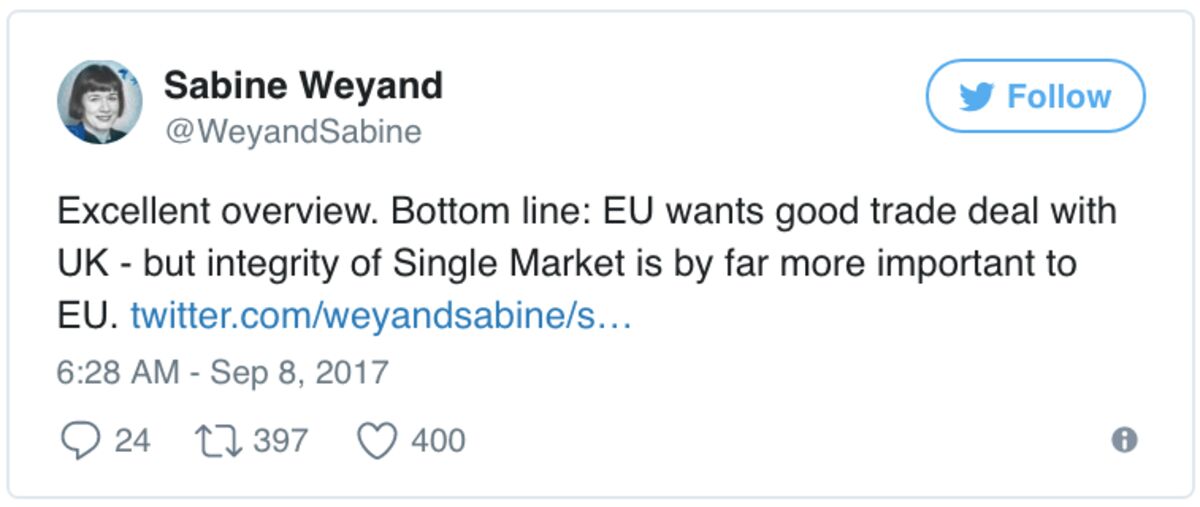
European policy makers are loathe to follow the playbook of U. President Donald Trump, but when it comes to Twitter they may be drawing some inspiration.
Away from the Brexit negotiating table, normally faceless European Union bureaucrats, rarely quoted in the media, have started tweeting about the U.’s two-year process of leaving the bloc. And while it’s unlikely that millions of people are glued to their smartphones waiting for the latest dispatch from deputy chief Brexit negotiator Sabine Weyand like they do for Trump, it’s nevertheless helping shape the debate in London and Brussels.
The EU’s strong embrace of the social media platform, just as talks with the U. become increasingly rancorous, underscores the 28-nation bloc’s divergent approach to communication and the clash of cultures at the heart of the divorce. For the EU, the strategy is about following rules that can be explained in 140 characters; for Britain, obscurity can be used as leverage, which may explain why U. negotiators have shied away from the online soap box.
British politicians “are desperate at the moment to have as much ambiguity as possible about what they are doing,” Colin Talbot, professor of politics at Manchester University, said in an interview. “It’s very difficult to be studiously ambiguous in 140 characters -- long-winded memos that say nothing are a lot less dangerous than tweets.”
‘Getting Nerdy’
Top of the EU tweeters is Weyand, the second-in-command after chief negotiator Michel Barnier. The German trade expert, a self-confessed “news junkie” according to her Twitter profile, frequently comments on articles about Brexit and posts explanations about the minutiae of EU rules. The bureaucrat, who has 13,548 followers and has sent 1,664 messages, often retweets comments by journalists and politicians which sometimes undermine British positions.
“This is getting nerdy,” she warned, in a tweet on Sept. 2, before demonstrating quite how nerdy by proceeding to explain the difference between EU countries and non-EU countries when it comes to the mutual recognition of standards. (Nerds should click here for her detail on that.)
Meanwhile, a BBC Radio show on the ambitions of the EU in the Brexit negotiations was an “excellent overview,” she said, because it reported that the integrity of the bloc’s single market is more important than a good trade deal with the U.
Her retweets of news articles during and after negotiating rounds, including one by Bloomberg News from Aug. 31 on how Brexit talks ended in “acrimony” because of a stalemate over the U.’s financial settlement, has helped signal the way the EU side is thinking.
Twitter Clarifications
Barnier isn’t quite so prolific but the former French foreign minister has used Twitter to clarify statements perceived to be misconstrued in the press, given personal responses to news articles and posted photographs of his visits around Europe where he discussed Europe’s approach to Brexit with government leaders. 21, when the U. published a flurry of documents setting out its position on several Brexit issues, he responded with 11 tweets explaining the EU side, together with a thinly veiled dig at the slow speed with which the U. had revealed its hand.
“EU positions clear and transparent since day one,” he wrote.
Earlier in the summer as British politicians talked up the benefits of failure to get an agreement, he explained the potential consequences. “In a classic negotiation ‘no deal’=status quo. #Brexit ‘no deal’=return to distant past, which we all should avoid,” he tweeted.
He also debunked the significance of a high-profile U. announcement that it was pulling out of a fishing arrangement: “No change: EU law / Common Fisheries Policy had superseded it,” he said, witheringly.
One of the EU’s most outspoken tweeters is Guy Verhofstadt, the former Belgian prime minister who is the European Parliament’s Brexit coordinator. Just in the last two weeks, he has tweeted that the U.’s leaked immigration plans “poisoned the diplomatic well,” said that “for years the EU bent over backwards to please Britain,” and alleged that “some of the #Brexit hardliners don’t want to negotiate.”
Twitter Diplomacy
Twitter diplomacy is a strategy that the U. side hasn’t embraced. Brexit Secretary David Davis, Barnier’s counterpart, has tweeted just once since March. 2 Olly Robbins, the Brexit department’s chief civil servant who goes head to head with Weyand, has only one tweet to his name.
“Front-rank British politicians have been very slow to take to social media -- especially those in government; at the top, there’s a high level of technological illiteracy,” Manchester University’s Talbot said.
So while the EU negotiators tweet the intricacies of Brexit, in Britain it’s left to those with loud voices but little direct influence to unleash on Twitter, such as former U. Independence Party leader and Trump acolyte Nigel Farage.
It’s fair to say his tweets are less “nerdy” and rather more straightforward than those of the EU’s Weyand.
His post on Saturday: “The EU isn’t desirable and it isn’t working.


0 comments:
Post a Comment